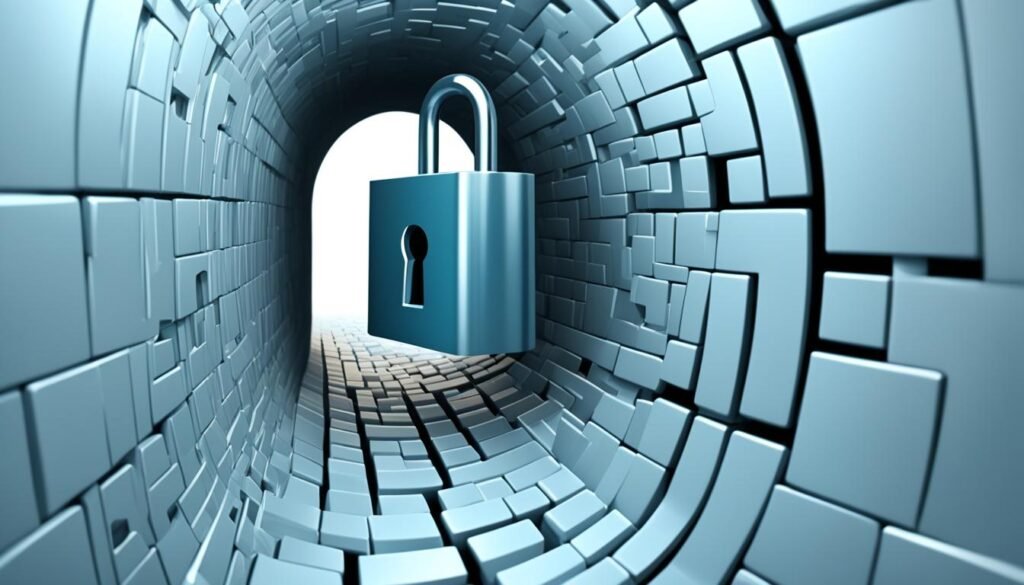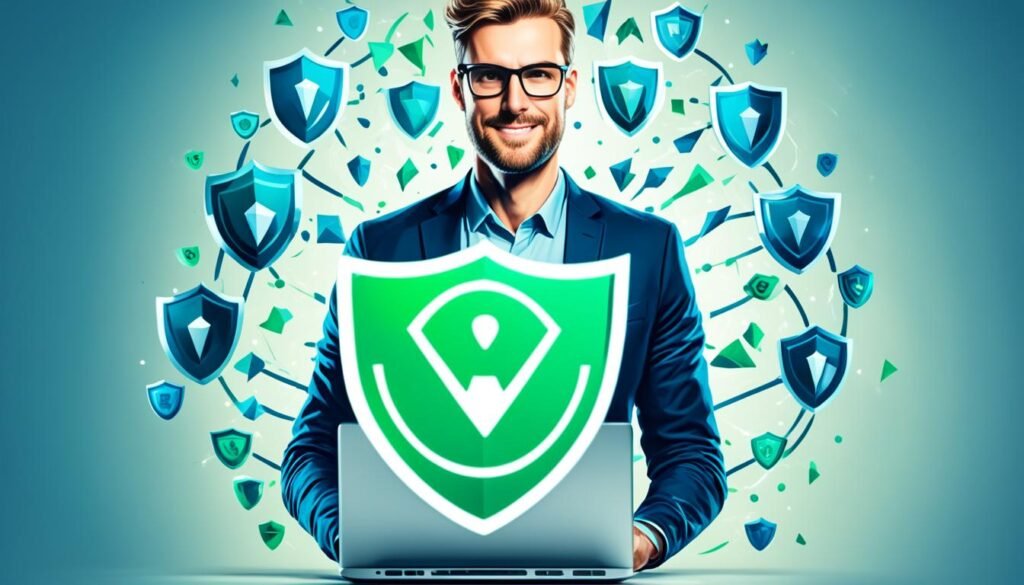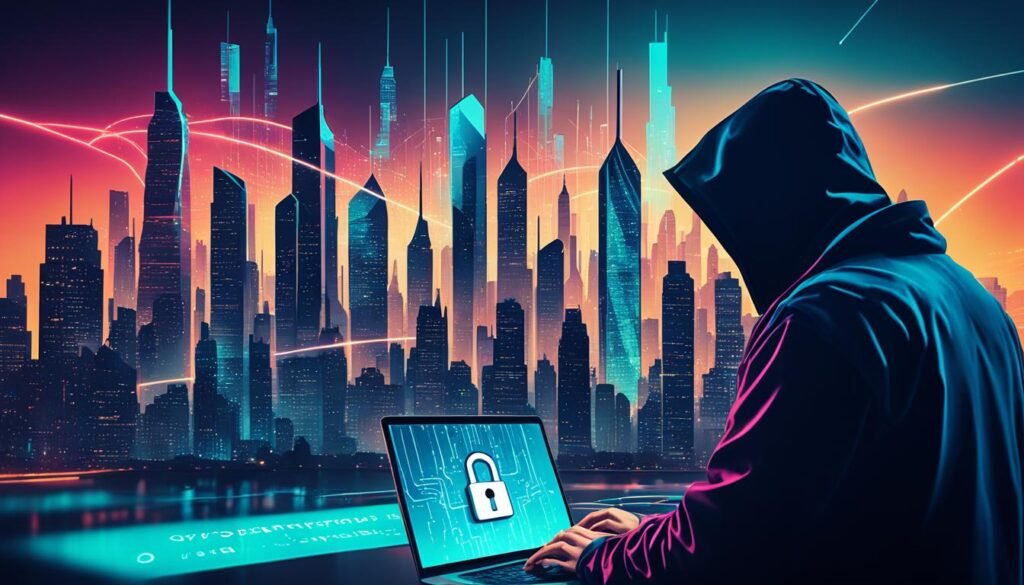Ever wondered how to keep your data safe on public Wi-Fi? The answer is virtual private network software.
A virtual private network, or VPN, creates a secure connection over the Internet. It’s a key tool for keeping data safe for both people and businesses. Using public Wi-Fi can be risky, but VPNs fix this by giving users secure access from anywhere.
VPNs bring many benefits, like better security, saving money on internet costs, and helping remote workers stay connected. There are different VPN types for various needs, making them flexible for many situations.
When picking a VPN, users look at things like cost, data limits, the company’s reputation, server locations, and privacy rules. More people are using VPNs to protect their online privacy and security. With so many options, choosing the right VPN is key to getting the most out of it and keeping data safe.
What is a Virtual Private Network?
A Virtual Private Network (VPN) is key for keeping your online activities private and safe. It creates a secure tunnel for your data, keeping it safe from prying eyes. This lets you surf the web safely, no matter where you are.
Definition and Basics
A VPN sets up a private network over the public internet. It makes sure all your internet traffic is encrypted. This means no one can see or steal your personal or business info.
How It Works
A VPN changes where your internet traffic goes. Instead of going straight to your ISP, it goes to a VPN server first. This encrypts your data, making it safe from hackers and cyber threats.
VPNs use strong encryption methods like OpenVPN, SSTP, IKEv2/IPSec, and WireGuard. OpenVPN is known for its strong 256-bit encryption. SSTP is great for Windows users, also using 256-bit encryption.
Protocols like IKEv2/IPSec are perfect for mobile devices, keeping you connected even on shaky networks. WireGuard is modern and easy to use, great for mobile users.
With these protocols, a VPN keeps your data safe and secure. It protects you from online threats, giving you peace of mind.
Top VPN Service Providers of 2024
The VPN service landscape is changing fast, and in 2024, five providers lead the pack. Proton VPN, NordVPN, Surfshark VPN, ExpressVPN, and TunnelBear VPN are top picks for privacy, speed, and features.
Proton VPN
Proton VPN shines with a 5-star rating from PCMag for its top-notch performance. It’s the only free option here, offering unlimited data for free users. With servers in 67 countries, it ensures a wide reach and dependable connections.
It allows up to 10 devices to connect at once and has an average internet speed loss of 21%. This makes it great for secure work online and streaming.
NordVPN
NordVPN stands out with the lowest average internet speed loss of 11%. PCMag rates it 4.5 stars. It has servers in 111 countries and 140 locations, offering great coverage. You can connect up to 10 devices at once and get 24/7 support.
It’s known for its excellent streaming, unblocking Netflix, Prime Video, and Disney+ easily. NordVPN is the best all-around VPN for most users, offering speed, ease of use, and strong security.
Surfshark VPN
Surfshark VPN is praised for its great value, with prices from $40 to $60 a year. It lets you connect unlimited devices, which is great for those with many gadgets. With servers in 100 countries, it offers a broad reach and keeps internet speeds down by 17%.
PCMag has given it a 4.0 excellent rating, making it a top choice for balancing cost and performance.
ExpressVPN
ExpressVPN is known for its strong performance, supporting up to eight devices at once and rated 4.0 excellent by PCMag. Although it costs about $100 a year, it’s worth it for its advanced features and a 25% speed loss. It has servers in many places, ensuring a reliable connection worldwide.
Its strong privacy features and good speed make it perfect for those who value security and performance.
TunnelBear VPN
TunnelBear VPN offers a free version with 500MB to 1.5GB of data per month, making it easy to try out. It has servers in 23 countries and a 4.0 excellent rating from PCMag. It focuses on easy use and secure browsing, making it great for users who want a simple VPN for everyday tasks.
It has an internet speed loss of 23%, which is good enough for regular use.
Importance of Online Privacy Protection
In today’s digital world, keeping your online privacy safe is key. Every day, over 2,200 cyberattacks happen, which means a cyberattack every 39 seconds. This puts both people and businesses at risk of losing their personal info. Plus, 95% of these digital breaches are because of simple mistakes, showing we need strong privacy measures online.
Why Privacy Matters
Keeping your online privacy safe is vital for protecting your freedom and keeping your personal info safe. Many digital places, like social networks and dating apps, collect a lot of your personal info. Even big names like Google collect your details to share with advertisers. Without good online privacy protection, you could face risks like identity theft and being taken advantage of.
How VPNs Protect Your Privacy
A good VPN is key to keeping your online activities private. They hide your IP address and encrypt your data with 256-bit encryption, making it hard for hackers to get into your online world. This encryption also stops your internet speed from slowing down by hiding what you’re doing online.
Good VPNs promise not to keep any of your personal info. They also have extra security like DNS leak protection and kill switches to keep your data safe, even if your VPN connection drops. With lots of servers to choose from, you can use VPNs to get around location-based blocks and access content from anywhere in the world.
For businesses, VPNs are a great way to grow without spending a lot. They let many employees and remote workers connect at once, saving money on support services. With their strong security and fast hardware, VPNs make sure you stay safe and private online.
Encrypted Data Transmission Explained

Encrypted transmission is key to VPN security. It keeps data safe from unauthorized access. VPNs use types of encryption to protect personal info and keep users private.
Types of Encryption
VPNs use different encryption methods for secure data transfer. These include:
- Symmetric Encryption: Uses the same key for both making and breaking the code, with AES being a top choice.
- Asymmetric Encryption: Needs a pair of keys—a public one for making the code and a private one for breaking it, like RSA.
- Transport Layer Security (TLS): Makes sure data is safe on a network, often used for online chats.
256-bit encryption is common in VPNs like OpenVPN and IKEv2, making encrypted transmission secure. WireGuard uses ChaCha20 for speed and security.
Benefits of Encryption
Encryption has many benefits, such as:
- Data Protection: Keeps info like social security numbers and personal messages safe from hackers.
- Preventing ISP Throttling: Encrypting internet connections hides how much data is used, stopping ISPs from slowing it down.
- Bypassing Restrictions: Encryption lets users get past government and location-based internet blocks, giving them free internet.
- Maintaining Privacy: By encrypting data, VPNs keep what users do online private from others.
Choosing a VPN with strong types of encryption, like 256-bit, is key. It protects data and keeps our online lives private in today’s connected world.
Factors Affecting VPN Speed
Using a VPN can change how fast your internet works. Knowing what affects speed helps you pick the best option for your needs.
Impact of Encryption
Encryption is a big factor in VPN speed. It makes your data safe but can slow down your internet. Services like IKEv2/IPsec, WireGuard, and Lightway try to keep things fast and safe. But, strong encryption, like AES, can make your computer work harder and slow things down.
Server Location and Load
The server’s location and how busy it is affect VPN speed a lot. Being far from the server means more delay and lost data. If many users are on the same server, it gets slower for everyone.
Choosing a VPN with many servers can help avoid slow speeds. NordVPN, for example, was one of the fastest in tests in 2024, losing only 11% speed.
Internet Connection Speed
Your internet speed also impacts how fast your VPN works. VPN speed usually matches your internet speed. For just browsing the web, you need at least 10 Mbps download speed.
For HD videos, you need 5-10 Mbps. For video calls, 3-5 Mbps is enough. If you work from home, aim for 10-25 Mbps download and 5-10 Mbps upload for smooth work.
Comparing VPN Protocols
Choosing the right VPN protocol is crucial for your online safety and speed. We’ll look at OpenVPN, WireGuard, and IKEv2/IPsec. Each has its own strengths and benefits.
OpenVPN
OpenVPN started in 2001 and is open-source. It’s known for strong security. It uses algorithms like AES and ChaCha20 for encryption.
OpenVPN is great for streaming and stable connections. It’s fast and secure. But, you need to install extra software, which might be a hassle for some users.
WireGuard
WireGuard came out in 2015 and is known for its speed and reliability. It has a modern design for VPN connections. It uses ChaCha20 for encryption and Poly1305 for authentication.
WireGuard is super fast and great for streaming. It’s also very stable for peer-to-peer connections. Like OpenVPN, you’ll need to install extra software.
IKEv2/IPsec
IKEv2 is often used with IPsec and is great at reconnecting when networks change. It’s been around since the 1990s but is still strong today with 256-bit encryption. This includes AES 256 and Blowfish.
IKEv2/IPsec offers a fast and stable VPN connection. It’s good for streaming and peer-to-peer connections. Plus, it’s easy to set up because it comes with many systems.
When comparing these VPN protocols, each has its own benefits. OpenVPN and WireGuard offer great security. IKEv2/IPsec is known for its easy use and strong encryption. Choose based on what you need most: security, speed, stability, or ease of use.
VPNs for Streaming and Unblocking Content
Virtual Private Networks (VPNs) are key for getting past geo-restrictions on popular streaming services. They hide your location, letting you access content from around the world. This means you can enjoy shows and movies from Netflix, Hulu, and Amazon Prime Video.
Popular Streaming Services
With a VPN, you can unlock content from popular streaming services like:
- Netflix
- Amazon Prime Video
- Disney Plus
- BBC iPlayer
- Hulu
- Sling TV
- HBO
How VPNs Bypass Geo-Restrictions
A streaming VPN works by giving you an IP address from another country. This makes streaming services think you’re in a place where the content is available. So, you can watch a wider variety of TV shows, movies, and more.
Best VPNs for Streaming
When picking a VPN for streaming, look at speed, server options, and quality. Here are some top picks:
- NordVPN: It’s fast and great at unblocking content. With over 6,000 servers in 61 countries, it supports up to 6 devices at once. It’s perfect for streaming HD and 4K.
- ExpressVPN: It has 3,200 servers in 160 locations across 105 countries. It offers solid speeds (750 Mbps) and lets you connect up to 8 devices at once, making it great for streaming.
- Surfshark: It’s all about being affordable. Surfshark lets you connect unlimited devices and has servers in 100 countries, making it a budget-friendly choice.
- Proton VPN: Even though it has paid services in 91 countries, Proton VPN is known for its strong privacy and decent speeds. It’s a good pick for streaming.
- CyberGhost: It offers a 45-day money-back guarantee and lots of servers. CyberGhost has good speeds and specific servers for streaming popular platforms.
TechRadar tested many VPNs and found NordVPN is the best for streaming. They did over 2,200 tests to make sure users can easily unblock content on their favorite platforms. Whether you want to watch foreign films, international sports, or exclusive shows, a streaming VPN makes it all possible without geo-restrictions.
Anonymous Browsing with a VPN
In today’s digital world, keeping your online life private is key. Many Americans trust credit card companies more than the government with their info. This shows how important tools like virtual private networks (VPNs) are for staying anonymous online. A VPN makes a secure link between your device and a VPN server. It also hides your IP address, making it tough for others to track what you do online.
No-logs VPNs are great for those who value their privacy. They don’t keep track of what you do online. This means if someone asks for your data, there’s nothing to give. But, some VPNs, even free ones, might keep logs or sell your data, risking your privacy. It’s smart to pick trusted providers like Surfshark, which uses top-notch encryption and secure servers.
VPNs help you browse privately, but adding secure browsers and private search engines can boost your privacy even more. Secure browsers hide your traffic by sending it through several nodes. But, they might be slower than usual browsers. Also, private browsing modes clear your history and cookies but don’t erase all data. For the best privacy, using several protection tools together is best when you’re online.


